#its fine if you disagree with me
Text
Very interesting to me that a certain subset of the BES fandom's favourite iterations of Mizu and Akemi are seemingly rooted in the facades they have projected towards the world, and are not accurate representations of their true selves.
And I see this is especially the case with Mizu, where fanon likes to paint her as this dominant, hyper-masculine, smirking Cool GuyTM who's going to give you her strap. And this idea of Mizu is often based on the image of her wearing her glasses, and optionally, with her cloak and big, wide-brimmed kasa.
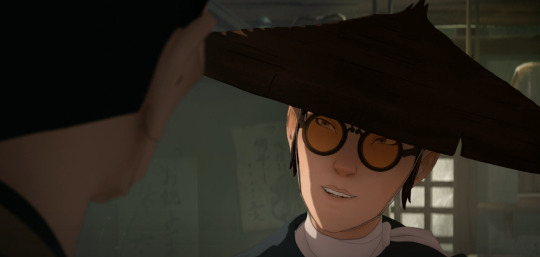

And what's interesting about this, to me, is that fanon is seemingly falling for her deliberate disguise. Because the glasses (with the optional combination of cloak and hat) represent Mizu's suppression of her true self. She is playing a role.

Take this scene of Mizu in the brothel in Episode 4 for example. Here, not only is Mizu wearing her glasses to symbolise the mask she is wearing, but she is purposely acting like some suave and cocky gentleman, intimidating, calm, in control. Her voice is even deeper than usual, like what we hear in her first scene while facing off with Hachiman the Flesh-Trader in Episode 1.
This act that Mizu puts on is an embodiment of masculine showboating, which is highly effective against weak and insecure men like Hachi, but also against women like those who tried to seduce her at the Shindo House.
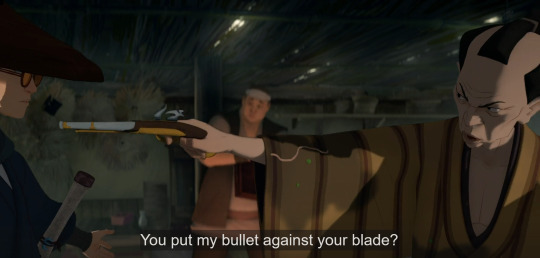

And that brings me to how Mizu's mask is actually a direct parallel to Akemi's mask in this very same scene.
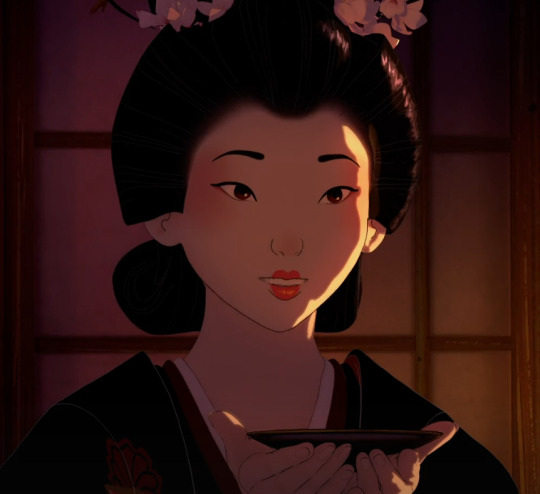
Here, Akemi is also putting up an act, playing up her naivety and demure girlishness, using her high-pitched lilted voice, complimenting Mizu and trying to make small talk, all so she can seduce and lure Mizu in to drink the drugged cup of sake.
So what I find so interesting and funny about this scene, characters within it, and the subsequent fandom interpretations of both, is that everyone seems to literally be falling for the mask that Mizu and Akemi are putting up to conceal their identities, guard themselves from the world, and get what they want.
It's also a little frustrating because the fanon seems to twist what actually makes Mizu and Akemi's dynamic so interesting by flattening it completely. Because both here and throughout the story, Mizu and Akemi's entire relationship and treatment of each other is solely built off of masks, assumptions, and misconceptions.
Akemi believes Mizu is a selfish, cocky male samurai who destroyed her ex-fiance's career and life, and who abandoned her to let her get dragged away by her father's guards and forcibly married off to a man she didn't know. on the other hand, Mizu believes Akemi is bratty, naive princess who constantly needs saving and who can't make her own decisions.
These misconceptions are even evident in the framing of their first impressions of each other, both of which unfold in these slow-motion POV shots.
Mizu's first impression of Akemi is that of a beautiful, untouchable princess in a cage. Swirling string music in the background.
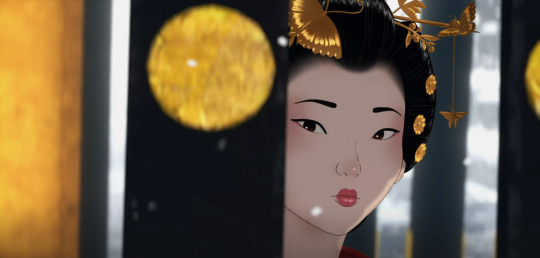
Akemi's first impression of Mizu is of a mysterious, stoic "demon" samurai who stole her fiance's scarf. Tense music and the sound of ocean waves in the background.

And then, going back to that scene of them together in Episode 4, both Mizu and Akemi continue to fool each other and hold these assumptions of each other, and they both feed into it, as both are purposely acting within the suppressive roles society binds them to in order to achieve their goals within the means they are allowed (Akemi playing the part of a subservient woman; Mizu playing the part of a dominant man).
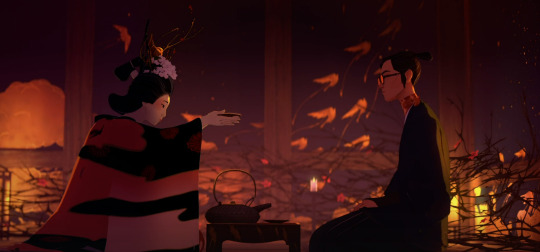
But then, for once in both their lives, neither of their usual tactics work.
Akemi is trying to use flattery and seduction on Mizu, but Mizu sees right through it, knowing that Akemi is just trying to manipulate and harm her. Rather than give in to Akemi's tactics, Mizu plays with Akemi's emotions by alluding to Taigen's death, before pinning her down, and then when she starts crying, Mizu just rolls her eyes and tells her to shut up.
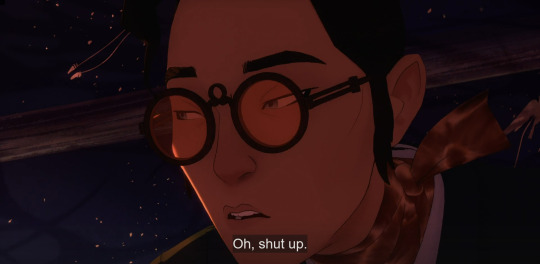
On the opposite end, when Mizu tries to use brute force and intimidation, Akemi also sees right through it, not falling for it, and instead says this:
"Under your mask, you're not the killer you pretend to be."
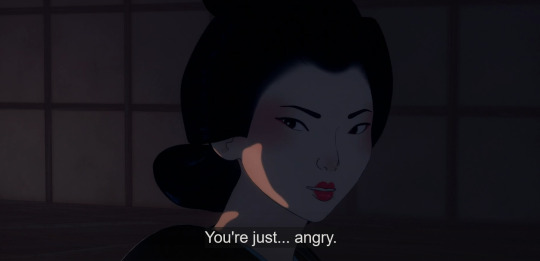
Nonetheless, despite the fact that they see a little bit through each other's masks, they both still hold their presumptions of each other until the very end of the season, with Akemi seeing Mizu as an obnoxious samurai swooping in to save the day, and Mizu seeing Akemi as a damsel in distress.
And what I find a bit irksome is that the fandom also resorts to flattening them to these tropes as well.
Because Mizu is not some cool, smooth-talking samurai with a big dick sword as Akemi (and the fandom) might believe. All of that is the facade she puts up and nothing more. In reality, Mizu is an angry, confused and lonely child, and a masterful artist, who is struggling against her own self-hatred. Master Eiji, her father figure who knows her best, knows this.
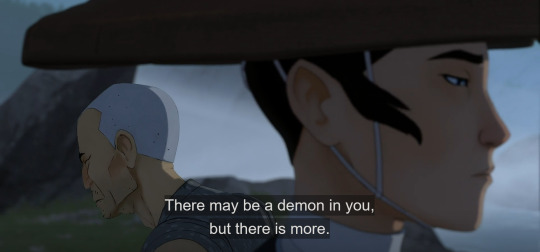
And Akemi, on the other hand, is not some girly, sweet, vain and spoiled princess as Mizu might believe. Instead she has never cared for frivolous things like fashion, love or looks, instead favouring poetry and strategy games instead, and has always only cared about her own independence. Seki, her father figure who knows her best, knows this.
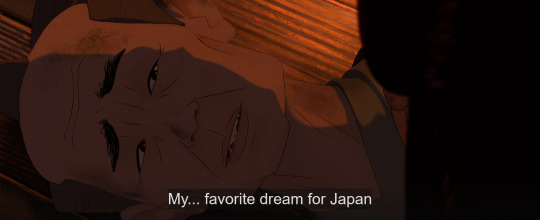

But neither is she some authoritative dominatrix, though this is part of her new persona that she is trying to project to get what she wants. Because while Akemi is willful, outspoken, intelligent and authoritative, she can still be naive! She is still often unsure and needs to have her hand held through things, as she is still learning and growing into her full potential. Her new parental/guardian figure, Madame Kaji, knows this as well.
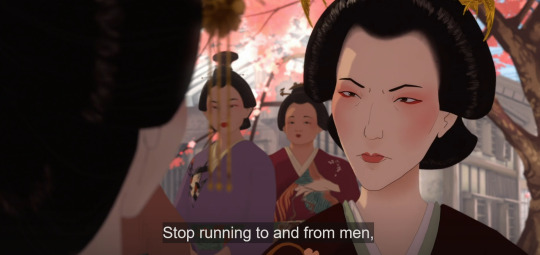
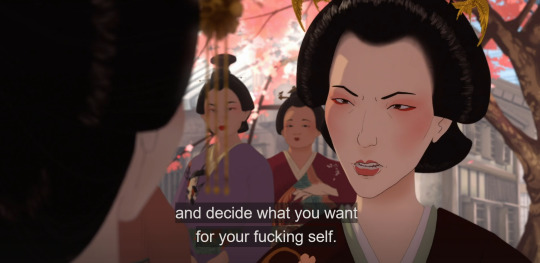
So with all that being said, now that we know that Mizu and Akemi are essentially wearing masks and putting up fronts throughout the show, what would a representation of Mizu's and Akemi's true selves actually look like? Easy. It's in their hair.
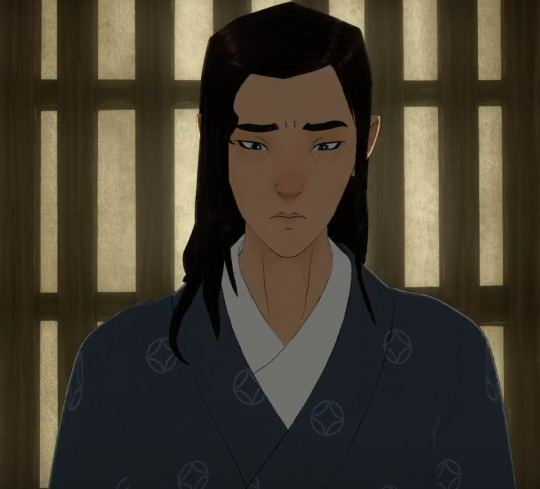

This shot on the left is the only time we see Mizu with her hair completely down. In this scene, she's being berated by Mama, and her guard is completely down, she has no weapon, and is no longer wearing any mask, as this is after she showed Mikio "all of herself" and tried to take off the mask of a subservient housewife. Thus, here, she is sad, vulnerable, and feeling small (emphasised further by the framing of the scene). This is a perfect encapsulation of what Mizu is on the inside, underneath all the layers of revenge-obsession and the walls she's put around herself.
In contrast, the only time we Akemi with her hair fully down, she is completely alone in the bath, and this scene takes place after being scorned by her father and left weeping at his feet. But despite all that, Akemi is headstrong, determined, taking the reigns of her life as she makes the choice to run away, but even that choice is reflective of her youthful naivety. She even gets scolded by Seki shortly after this in the next scene, because though she wants to be independent, she still hasn't completely learned to be. Not yet. Regardless, her decisiveness and moment of self-empowerment is emphasised by the framing of the scene, where her face takes up the majority of the shot, and she stares seriously into the middle distance.
To conclude, I wish popular fanon would stop mischaracterising these two, and flattening them into tropes and stereotypes (ie. masculine badass swordsman Mizu and feminine alluring queen but also girly swooning damsel Akemi), all of which just seems... reductive. It also irks me when Akemi is merely upheld as a love interest and romantic device for Mizu and nothing more, when she is literally Mizu's narrative foil (takes far more narrative precedence over romantic interest) and the deuteragonist of this show. She is her own person. That is literally the theme of her entire character and arc.
#blue eye samurai#mizu blue eye samurai#akemi blue eye samurai#blue eye samurai meta#just in case... im gonna tag this as#mizukemicritical#akemizucritical#though this post isnt actually criticising the ship itself but rather fanon's portrayal of the ship and the characters#for that reason lemme also tag this as#wank.mp3#feel free to disagree of course but please be civil#and if you need to rant about how wrong i am without any convincing evidence kindly feel free to make your own post. peace and love <3#fandom.rtf#meta dissertations.pdf#shut up haydar#edit: for full disclosure. i do rather dislike this ship. but obviously it's fine for anyone to enjoy it. please do! have your fun!#it's just that as usual! popular fanon and fandom around a ship is what has completely deterred me from any sense of enjoyment of it#it's a shame too because i was very open and even eager for some mizu/akemi romance in the future#but out-of-character fanon + the rudeness of certain fans has definitely soured it for me#but that doesn't mean people can't enjoy it obviously! ship and let ship!!!#plus it has its appeal which i DO STILL see and enjoy!!!!#i would even go as far as to call them soulmates because their narratives and characters are LITERALLY intertwined!!!#but. yeah. my gradual distaste for this ship is indeed very unfortunate.
802 notes
·
View notes
Text
About Grand Fest,
It is not a 'pick your favourite idol group' splatfest.
You can do that, but that just tells me that you don't care about the outcome for the next game.
This isn't necessarily the Final Fest, but it can still have important repercussions. (It could simply be some Anniversary Fest with an important effect!)
It is exactly what it says on the box. Past vs Present vs Future. That's it. Not a scrap between fans over their preferred idols. The community loves boiling almost every fest down to 'wHiCh iDoL dO YoU PrEfEr?' instead of the actual theme.
Past could give lore-hungry fans more insight into the world of Splatoon. Present could explore other regions of the ingame universe. Future could introduce changes and shiny new playthings with more detail.
We are not fighting over the Squid Sisters, Off the Hook and Deep Cut.
(Also, tumblr is my only source. If people want to add to this with thoughts or extra info, feel free! I'm just stating my opinion on the topic, and if your idol matches with the theme you like; you don't need to listen to this rambling fool!)
#sp7's rambling tag#long post#rant i suppose#splatoon 3#splat3#splatoon#splatfest#final fest#grand festival#grandfest#after i did this i drafted it whilst i worked out if i wanted to post it or not#i will because it was a nightmare editing the text with colours and stuff#ALSO DONT MURDER ME IF YOU DISAGREE JUST IGNORE ME#IF YOU WANT TO PLAY THE SPLATFEST LIKE THAT ITS FINE#JUST DONT MAKE IT THE ONLY THING YOU DO#sorry im just saying it loud enough for those in the back#:]
75 notes
·
View notes
Text
Treatise on why No, the doctor just giving the narrator of Fight Club (full name) his requested sleep medication or sending him to therapy would not have Fixed Him
Firstly, saying giving him the insomnia meds would’ve fixed him ignores the reason he has insomnia in the first place. He is so deeply upset by his place in society that he literally cannot sleep. Drugging him to sleep would not change that. That, of course, is the easy, quick response.
But with regard to therapy? The biggest flaw is that it ignores a central tenet of the book. Part of what tortures the narrator and drives him to invent Tyler is that his feelings about this collective, systemic issue are constantly reduced to a Just Him thing. His seatmates ask what his company is. He’s the only one upset at the office. He gets weird looks if he says the truth of what he does. People will do anything in their power to pretend he is the issue, as an individual, because it is far scarier to consider the full implications of the systemic issues implied by what he is saying. Everyone treats it as if the issue is him, so he goes insane. He does anything to get someone to say, holy shit, that’s fucked up, what you’re a part of is wrong. In an attempt to feel any sort of vague sympathy and catharsis, he goes to support groups to pretend to be dying, because then at least people don’t habitually blame him for his anguish.
Saying therapy would fix him ignores that his problems are not individual. They are collective. It’s the reason the entire story resonates with people! Something deeply, unignorably wrong with society, where people would rather blame you for bringing it up than try and address it, because it feels impossible. I don’t blame people for this, really, because it IS scary. It’s terrifying to sit and feel like you’ve realized there’s something deeply, deeply wrong, but if you say something, people will get mad at you since it’s so baked into everything around you. Or, even if they agree, it’s easier to deal with the dissonance by pretending it’s individual.
And it’s not like that’s not the purpose therapy and medications largely serve, anyway. Getting into dangerous territory for this website, but ultimately, the reason the narrator was seeking medication was because it’s a bandaid. A very numbing bandaid. For these very large, dissonance causing problems, therapy does very little. Medications do what they always have, and distract you with numbness or side effects. It’s a false solution. He is seeking an individualized false solution because he has been browbeaten with the idea that this is an issue with him alone, when it's plainly clear it's not.
Don't get me wrong. Obviously he has something wrong with him. But it's a product of his situation. It is a fictional exaggeration of a very real occurrence of mental illness provoked by deep unconscionable dissonance and anguish. There is a clear correlation between what happens and his mental state and his job and how isolated he is.
The thing is, even if he were chemically numbed, I do think he would’ve lost it regardless. Many people on meds find they don’t fix things. For reasons I’ll get into, but in this case because even if numbed or distracted, once you’ve learned about deep, far reaching corruption in society, it’s very hard to forget. Especially if, in his case, you literally serve as the acting hand of this particular variety. He’s crawling up the walls.
So why do people say this? Well, it's funny I guess. Maybe the first time or whatever. But also, often, they believe it, to a degree. Maybe they've just been told how effective therapy and meds are for mental illness, they believe wholeheartedly in The Disease Model of Mental Illness, maybe they themselves have engaged with either and have considered it successful. Maybe they or someone they know has been 'saved' by such treatments.
But in all honesty.... What therapy can help with is mentality, it's how you approach problems. For issues on a smaller scale, not meaning they are easier to deal with my any degree, but ones that are not raw and direct from deep awareness of corruption; these are things that can be worked through if you get lucky and get an actually good therapist who helps build up your resiliency. But when your issue is concrete, something large and inescapable? It's useless. At best it can help you develop coping mechanisms, but there is a limit for that. There is a point where that fails. To develop the ability to handle something like this requires intense development of a comfort with ambiguity and dissonance and being isolated and a firm positioning of your purpose and values and and belief in wonder and all the other shit I ramble about. The things that the narrator lacks, which lead him to taking an ineffectual death knell anarchist self-destruction path. Therapy, where the narrator is, full of the knowledge of braces melted to seats and all the people that have to allow this to happen? It fails.
And meds — meds are a fucking scam. We know the working mechanism of basically none of them, the serotonin receptor model was made up and paid its way into prominence. We have very little evidence they're any better than placebo, and they come with genuinely horrific side effects. Maybe you got lucky. I did, on some meds. On others? I don't remember 2018. The pharmaceutical industry is also known for rampant medical ghostwriting, and for creating 'off-label' uses for drugs that have gained too many protests in their original use, then creating a cult of use to then have 'grassroots' campaigns for it to be made a label use (ie, legitimize their ghostwritten articles with guided anecdotes).
The DSM itself is basically a marketing segregation plot. It's an attempt to legitimize the disease model by isolating subgroups of symptoms to propose individualized treatments for subgroups that are not necessarily all that separate. But if the groups exist, you can prescribe more and different medications, no? Not to mention, if you use the disease model, you can propose that these diseases are permanent, or permanent until treated, considered more and more severe to offset and justify the horrific side effects of the medications. Do you know why male birth control doesn't really exist? Same reason. They can justify all the horrible side effects for women, because the other option is pregnancy. For men, it's nothing.
And they're not bothering to invent new drugs without side effects. When they invent new drugs it's just because the last one got too bad of a name, or they can enter a new market. Modern drugs don't work any better than gen1 drugs. They still have horrific side effects. At best, the industry will shit out studies saying the old one was flawed (truth) so they can say this new gen will be better (lie). They're doing it with ssris right now.
Fundamentally, the single proposed benefit of any of these drugs is that they numb you. To whatever is torturing you. It's harder to be depressed if you can't feel it, or if you just can't muster the same outrage. Of course, there is people who find that numbness to be helpful, or worth it. But often, it's stasis. For the people who have problems that can be worked on, it serves as a stopgap to not actually work on said problems. The natural outcome of the disease model is stagnation for those whose need is to develop skills and resiliency. It keeps them medicalized and dependent on the idea that they're diseased and incapable. Profitable. Stuck in the womb.
I’ve been there. It’s easier, to wallow, and resist growth because it’s difficult and painful and unfair and cruel and you can think of five billion reasons to justify your languishing. But don’t listen to anyone who tells you you’re just permanently damaged, no matter how nicely they word it, no identity or novel pathologization, no matter how many benefits they promise, especially if they swear up and down some lovely expensive medications with little solid backing and plentiful off-label usage and side effects that’ll kill you. Some days it feels like they want us all stuck in pods, agoraphobic and addicted to the ads they feed us to isolate the markets for the drugs they’ve trained us to beg them to pump us with. Polarization making it as easy as flashing blue light for go, red like for stop, or vice versa. I worry about the kids, for fucks sake. That’s a bit dark and intense, and I apologize. But I want you (generic) to understand, there is a profit motive. Behind everything. And they do not mean well. They do not care about your mental health or your rights or your personhood or your growth. They care about how they can profit off of you.
For those struggling with immovable, society problems, like the narrator grappling with how his job fits into and is accepted by society while his rejection and horror in the face of it does not, it can work about as well as any other drug addiction. Your mileage may vary. From what I've seen, recovering from being on prozac for a long time can be worse than alcohol. They put kids on this shit. They keep campaigning for more. Off label, again. A pharmaceutical company’s favorite thing to do has to be to spread rumors of someone who knows someone who said an off label use of this drug helps with this little understood condition. Or, in the case of mental illness, questionably defined condition. And like, damn, I know I'm posting on the 'medicalization is my identity' website so no one will like all this and has probably stopped reading by now, but yall should be exposed to at least one person who doubts this stuff. Doesn't just trust it. Because I mean, that's the thing right?
It's so big. What would it mean, for this all to be true? Yeah, everyone says pharmaceutical companies are evil and predatory and ghostwriting, but to think about what that really entails. Coming back to the book, everyone knows the car lobby is huge and puts dangerous vehicles through that kill people. What does it mean if the car companies all hire people to calculate the cost of a recall and the cost of lawsuits? No one wants to think about the scale that means for people allowing it or the systems that have to be geared towards money, not safety like they say. Hell, even Chuck misses the beat and has the narrator threaten his boss with the Department of Transportation. And shit, man, if every company is doing this, you think Transportation doesn't know? That they give a fuck? You're better off mailing all the evidence to the news outlets and hoping they only character assassinate you a little bit as they release the news in a way that says it's all the fault of little workers like you, not the whole system. Something something, David McBride, any whistleblower you feel like, etc.
So I don't blame you, if your reaction is "but but but, that can't be right, people wouldn't do it, they wouldn't allow it" or just an overwhelming feeling of dread that pushes you to deny all of this and avoid thinking about it. Just know, that's in the book. That's all the seatmates on the flights. That's all his fellow officemates. It's easier to pretend, I know.
But think about, how the response fits in with the themes of the book. The story, as a movie too. What drives the narrator’s mental breakdown? How would you handle being in his position? How would you handle being his seatmate? It’s easy to say you’d listen. But have you? Have you had any soul wrenching betrayals of how you thought society worked? How about a betrayal by the thing that promised to be the fix of the first? Can you honestly say you wouldn’t follow that gut instinct, saying follow what everyone says, that person must just be crazy, evil, rude, cruel, whatever it is that means you can set what they said aside?
For a lot of people, they can do that, I guess. Set it aside. Reaching that aforementioned state of managing to cope with the dissonance and ambiguity and despair is very hard. The narrator made the Big Realization, but he couldn’t cope. He self-destructed. Even when people don’t make the big realization consciously, they’re already self-destructing. It’s hard to escape it when it feels easier than continuing anyway. When it feels like the only option,
Would therapy fix the narrator of Fight Club? Would meds fix the narrator of Fight Club? No. He knows too much. All meds will do, by the time he’s in the psych ward, is spiritually neuter him. A silly phrase, but really. Take the wind out of his sails.
Is he fixed if he doesn’t try to blow up town? If he just shuts up and settles in and stops costing money? If he still can’t cope with the things he’s unearthed? Do you see how this is a commentary in a commentary in a commentary?
Fight Club is an absolutely fascinating story because of this. The fact that it addresses the fallout of knowing. The isolation. The hopelessness. The spiral that results from a lack of hope. This is, I think, what resonates most with people, even if not consciously. Going insane because you’ve discovered something you wish you could unknow. It’s a classic horror story. Should our society be lovecraftian evil? I don’t think so.
Do I think changing it will be easy? No. Lord knows a lot exists to push people who make these sorts of Realizations towards feelings of individuality and individualized solutions and denial and other distractions and coping methods. And to prevent people who make One realization from expanding on it and considering further ramifications. Fight Club itself gets into this; the isolation of men being a strict part of the role society shapes for their sex leaves them very vulnerable to death fetishes, in a sense, and generally towards self destructive violence. It helps funnel them away from substantial change and towards ineffectual change. Many things, misogyny, racism, serve to keep people isolated from one another, individualized, angry, and impossible to work with. Market segregation; god knows even appealing on those fronts has become such a classic ploy that companies do it now, the US military frames its plundering that way, etc.
I’ve wandered a bit but ultimately, my point is this: Fight Club is a love letter to the horrors of critical thinking, and the importance of not falling into the trap of self destruction and hopelessness in the face of it. The latter is why Tyler was an anarchoterrorist instead of anything useful. The latter is why it was a death cult. It’s important to work through the horrors of critical thinking so you can do it, and stand on the other side ready to believe in each other. It’s worth it.
#fight club#my writing#uh. sorta#If you disagree with me it's fine btw. That's a given for me but I realize that's not usual for this website#my big desire is always to provoke thought and get people to think about why they think things#not necessarily to get them to agree with me. though obviously like any person i enjoy that#it was nice to type this out#also#aside from the prozac withdrawals mention and my own experience w memory loss (hilariously not even the most major of my beefs with the#medical industry! or even just the mental health industry! but its an easy nonoffensive one so#anyway i kept it nonspecific because if you go specific it becomes easier for people to just go 'oh well its That that's the problem and i#dont need to reflect at all on my drug/condition/issue/etc'#which ppl will anyway ofc. but yk#maybe theyll find it easier to ignore without the horrific specific examples but i want to leave it broad because 1. doing research and#going past the first thing you find and confirmation bias stuff is good 4 u#second. it's better imo to leave it more open for people to try and apply it broadly#whew ANYWAY#a bonafide Rant#i shouldve put#anti psychiatry#in the first few tags. i havent really looked on tumblr to see what the community 4 that is like on here because it feels like an oxymoron#on this website#but im sure it probably exists even if its used for smth else#(please change)
67 notes
·
View notes
Text
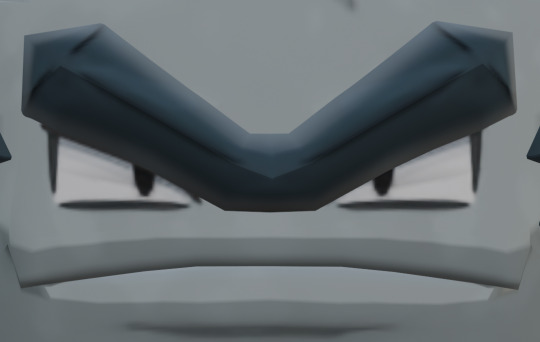
#alolan graveler#i always felt that out of all the alternate forms‚ this one was the closest to its “source material‚” per se#it's Basically just a color swap with some big eyebrows. all of the alolan geodude line is kinda like this#just with some big facial hair for some reason#i guess alolan vulpix is kinda like that too. it's basically just a palette swap. but it's Going for something#i wouldn't be able to look at alolan geodude and tell you that it's fucking. ice/electric type or whatever the hell this thing is#ok rock/electric fine. yeah i wouldn't be able to tell you that. but alolan vulpix Looks like an ice-type. also it's cute and this is not#alolan vulpix is a valid palette swap. i don't think this thing is#also for the record i am not being MEAN to the alolan geodude line#i just didn't know what else to comment on besides the eyebrows. i don't HATE them i just think they're palette-swaps#if you disagree with me on that then. well. i guess i am going to get the reputation of being a jackass to every pokémon
105 notes
·
View notes
Note
talks to u
You will regret talking to me I'm very very sorry
So recently my sister has been reading out loud to me [it is very fun I wish I had someone to read out loud to] and the book she picked was Haunting on the Hill. This book was an absolute minefield of a read because it was advertised as a spiritual sequel to Haunting of Hill House and HOHH is probably one of the books I've been the most emotionally invested in ever. Mostly because I see people take the book and Try To Do It Better constantly, and they do it wrong over and over and over again. I don't know how this became My Hill To Die On, but no one can do a remix of the genre right, especially those that pretend like they're trying to.
Hell House, for example, a book that I hate with my entire being, was a very intentional stab at HOHH. It took the trope of four people -- one a slightly older gentleman who is doing research on the property -- two women -- who is a lonely homebody, and one who is a (implied) bisexual psychic -- and one younger man about their age who has some Obvious Substance Abuse Problems, and sets them in a haunted house to try and figure out why its haunted. The author then spends the rest of the book punishing those characters for obvious perceived societal slights. The old man's sin is being old, and dies because he isn't virile and strong enough to withstand the house [unlike the young male protagonist]. The psychic is punished for believing she is psychic, being a confident woman who lives alone, and being implied bisexual [this is evident in the nature of her death, which I won't share here. It's fucking bad]. Then after these characters die, the white male savior comes back, something to do with the old owner of the house haunting it with his willpower, in a closet with a glass of water? It made no sense. But the metaphor the book was obviously leaning towards was, the Good Guy can win and get the girl if he has strength of mind, is vaguely psychic [but better than the psychic lady obviously] and fucking stands around long enough while his friends are killed.
House on the Hill, which should have been marketed as a reference to Hill House and not as a spiritual successor, is a passable haunted house book that attempts to remix the story by making all of the main characters theater kids. There is an older lady who has been ousted from her community for being too old, the young woman main protagonist who is the Ellie parallel, the Theadora parallel is her girlfriend, a bisexual actress who is maybe a little too full of herself, and their single male character has a substance abuse problem involving cocaine instead of alcohol, like Luke from the original book. The author even seems to have grasped some of the original intention of HoHH as a conversation about isolation and loneliness. However about halfway through the book, it takes a turn and seems to punish Theadora for being the character she was written as, in the same way Hell House punished its Theadora allegory character. The rest of the book proceeds with a lot of standard haunted house tropes -- not a bug exactly, but they don't reinforce any extended metaphor. They're mostly there to be spooky. Which would be fine for a standard haunted house book, but not for a haunted house book that claims its the sequel to HoHH.
You see, Haunting of Hill House, and by extension, Shirley Jackson, the author, have a very subtle but also deeply impactful metaphor about loneliness going on in the background, and everything from the haunted house to the fallout of the characters reemphasizes this theme.
Ellie, Eleanor, is an exhausted housewife-style woman in the 1960s, whose never gone anywhere or done anything with her life, because instead of marrying and moving across the country somewhere, she stayed home to take care of her ailing mother. Now that her mother is dead, she lives with her sister and brother-in-law, and believes herself to be a general tax on the family. She fills stuck, alone, unloved and unwanted. The story is in her point of view, and you quickly realize her way of coping with her trapped feelings involves fantasticizing the world around her. She dreams of who she would be if she just lived over there in that little cottage, how differently her life would turn out if she had a cute little life in that one room house. Etc. When she accepts the summons to Hill House, she steals her brother in law's car and drives there on her own, her first trip alone anywhere in her entire life.
Theadora is a psychic who, if I'm remembering right, lives alone and owns a flower shop. She lives a much more interesting lifestyle than most women in the 60s, in a big city with many different friends and lovers coming and going, completely independent. There is an implication that she has trouble keeping interpersonal relationships -- she's a little too flighty -- and really a woman who can't settle down with a man is a red flag.
Doctor Montague seems fine on the surface, if a little jaded. He's a professor at university who is being slowly pushed out of his scientific field because he believes in the supernatural, and wants to prove it using empirical evidence. You find out his wife is very supportive in this venture -- too supportive. He thinks all of her contributions are nonsense, and so is she. His loneliness is self inflicted. He has a fan club right there with his wife, if he gave two shits about her opinions.
Last is Luke, an alcoholic, and the person in line to inherit Hill House. His loneliness is that he, doesn't want the fuckin' house. But because of his alcoholism and gambling problems, the family has decided he, as the cursed child, gets to take care of the cursed mansion no one else wants to touch. So Luke, ostracized from the family and a little shitty about it, decides he might as well rent out the place for some extra cash to fuel his various addictions. The family is going to be cutting him off soon anyway...
These four characters, over the course of Hill House, become haunted by the house, not because of tragic deaths there, or because the house is alive in any literal sense of the word. But because the House has the quality of an overbearing mother, smothering its children with its expectations. Any piece of furniture moved in the place is replaced as soon as they leave the room. Any door opened to allow air or light inside is shut the minute they walk into the next. The house rights itself back to a self-inflicted perfection that is unlivable, and it wants to isolate you too, to be like it. Hill House tells you exactly what it is and what it wants to do in the first paragraph: And all who walk there, walk alone.
Shirley Jackson wrote this very intentionally. As a woman in the 60s trying to have a successful writing career, none of her books were taken seriously. She was pigeonholed into mother and housewife first. Articles that wrote about her works at the time held the patronizing tone of someone congratulating a child who found a new hobby -- not a serious writer wanting to make poignant stories. Her books are lovely now, the few that were published. But Shirley Jackson lived a life that was full of anxiety and agoraphobia, in a world where she felt belittled and token. Her books are written the way they are for a reason. There is great loneliness in being shoved in a box.
I really love that exploration. I love how the people in the book descend into the box of Hill House, the expectations they place on each other, and the way all the women feel tonally dissonant in their token roles. And that's why I hate so many modern adaptations, or inspired-bys, or spiritual sequels. Hill House is a metaphor before it's a ghost story -- and that is why it succeeds as a ghost story! It is scary because you get invested in the characters' wellbeings, their doomed qualities, their individual, very subtle, madnesses. Watching new writers read the book and punish those characters over and over again for not acting right [especially Theadora, Jesus Christ.]
In fact, since I'm already ranting, I'm going to give you a quick rant in defense of Theadora.
Theadora breaks into the book as a very bright star in Ellie's world. She is, literally, everything Ellie wishes she could be. She lives an interesting life, alone, without being too cripplingly lonely. Theadora, used to a little bit of flirting and over friendliness, falls in with Ellie and Luke immediately. She is charming, and bright and beautiful, and Ellie, who's character flaw is romanticizing everything, falls head over heels for her. They get scared together. They comfort each other when the ghosts start acting up. They get haunted together. And Ellie decides, in the way of someone romanticizing something, when all this is over, she would like to live with Theo. But when she tells Theo this, Theo laughs it off. "This is just a holiday, Ellie dear. We will have to get back to our lives eventually." It's unfair to say this is a game for Theadora. I feel like her feelings in the book, all her charm and her flirting, are genuine. But they're genuine in the way of someone going on vacation and flirting around with the people they meet -- she has a normal life she enjoys that she plans on getting back to. Ellie, who is incredibly alone, and who feels like she has only just tasted happiness now that she's come to Hill House, doesn't want to go back home after this. This is the happiest she's ever been.
Ellie informs Theo she is going to follow Theo home, and Theo turns very, very mean. She starts hitting much harder on Luke [something that makes Luke uncomfortable, but something he never really stops, because Luke also likes the attention he's getting] and belittling Ellie and her wild fantasies. She pushes Ellie away. It isn't kind, but what else can she do? She told Ellie she doesn't want to be followed home and Ellie, trapped in her daydreams, doesn't listen.
The rest of the book unfolds. Hill House isolates Ellie, and makes her feel like she can have no happiness outside its smothering walls. She gets taken by it.
In every book that takes on the mantle of trying to tackle the themes that made Hill House great, I would like to ask you all this: Why do they always punish Theo?
Hell House straight up kills its Theo allegory in a very brutal, overt way, implying she deserves that brutality for her promiscuity. The House on the Hill kills its Theo for being too full of herself, for believing she was entitled to greatness.
Why?
You can make a case for the queer aspects of her probably. Or for misogyny. Or for infidelity. Or for the fact that she appears to choose Luke over her relationship with Ellie. But I notice none of these books punish their Ellie allegory for also falling for Theo. For also aspiring to be something other than a stuffy housewife somewhere. For also falling for Luke, and wanting him to be a part of her happiness fantasy.
In honesty, I really think these authors read Theo and think she's the antagonist. So they write their stories to punish the angry woman who was mean to poor, lonely Ellie. But, here's the kicker, Theadora isn't the antagonist. The house is. Loneliness is. The house leads Ellie to a perfect world, and Ellie, who is the way that she is, cannot fathom a world where that perfection is broken, so she ignores it. So she scares people with her over-attachment. So they try to send her away, because whatever is going on with her, it's not safe and it needs to stop. So she decides she would rather die than leave.
Theadora is only "the bad guy" because she's the one that reminds everyone that the fantasy of this perfect house must break eventually. The Doctor will have to go back to his university that doesn't take him seriously and his wife who takes him too seriously. Theadora will have to go back to her shop with her rotating friends who aren't as close as she'd like, but whom she can't force to stay. Luke will have to go back to his place as the unwanted, failing heir and Eleanor --
Well. Eleanor doesn't leave Hill House.
Everyone gets so mad at Theodora because of Ellie's investment in her. Because Ellie is lonely, and sad, and relatable. The first time I read Hill House, some of Ellie's lines made me want to cry they hit so close to home. All her assertions that when she spoke to people she said too much and was too stupid, she would be better tomorrow. All her quiet chastisements that she needs to be more interesting. All her attachments and how scared she is of being spurned. All her wonder when she looks around at the world and tries to imagine a better life. But it's not Theodora's fault that Ellie doesn't get that. It's Ellie's fault for becoming too attached to something that isn't there, and it sucks, and if this were a story with a happy ending, she would realize that and grow past that, but she doesn't. That's not how the story is written.
On one of the nights when the haunting happens, Ellie and Theo are sharing a room. They are laying in bed and holding hands while the house comes alive around them. Knocking on the walls. Slamming doors. Claws, and whispering, and scraping and screaming. Ellie and Theo hold each other's hands tightly. She hears the torturous sounds of a baby in the other room, a child in pain, screaming for its mother, and she's terrified and she's holding tight to Theadora's hand.
And finds, when the haunting stops, that Theo was out of reach the whole time.
Ellie asks, who's hand was I holding?
[The Haunting of Hill House is a metaphor.]
One of these days I'm going to sit down and write the Haunting of Hill House remake in my head, that I am just egotistical enough to believe I could do well. I would find a more modern metaphor first. Something to do with the loneliness of an infinitely interconnected world. Something to do with how boxed in we all feel, how trapped, and how so many people blame it on computers, even though they should be able to connect us more.
I would build a Hill House where the four characters meet on a forum, the first time they've found someone with similar interests. They would meet in person for this haunting expedition. They too would take in the oddness of a house that rights itself on its own, pretends they were never there. They two would fall in love with each other, and bond, and find community in a group of people who are constantly isolated and are glad to finally find someone they relate to.
They too would have to dear with the objective, lonely horror of realizing this doesn't magically fix their problems. That they were alone in the rest of their lives not just because the world isolated them, but because they're bad at forming connections. They would get catty, and disagree, and worry about the lives they need to go back to, and complain about spouses and partners. And one of them, as is Hill House's tithe, wouldn't be able to cope.
One of them, as is Hill House's tithe, wouldn't be able to leave.
Anyway, not sure where exactly this rant was going. Uh. Nice Sunday we're having anon. Got any niche special interests you've been meaning to unload recently?
#answering asks#anonymous#the barking writer#the haunting of hill house#the house on the hill#hell house#i feel like its worth mentioning i'm not the god of books you are welcome to disagree with me#in fact i encourage you to tell me your own takes on the books / stories if you feel the mood#except for hell house#im sorry my passion for that one still burns bright i would shred my copy but it was a library book so i returned it instead#if you like hell house i apologize i don't see it and i don't want to see it#house on the hill was fine i didn't read the whole thing but my sister did it seems like a solid spooky book#its just it really shouldn't have sold itself as a hill house book yanno?#[coughs]#anyway#uh#goodbye
47 notes
·
View notes
Text
Guys I’ve just seen a take so completely outrageous so I just wanna point out something one of the creators of total drama (Terry) has said in recent times
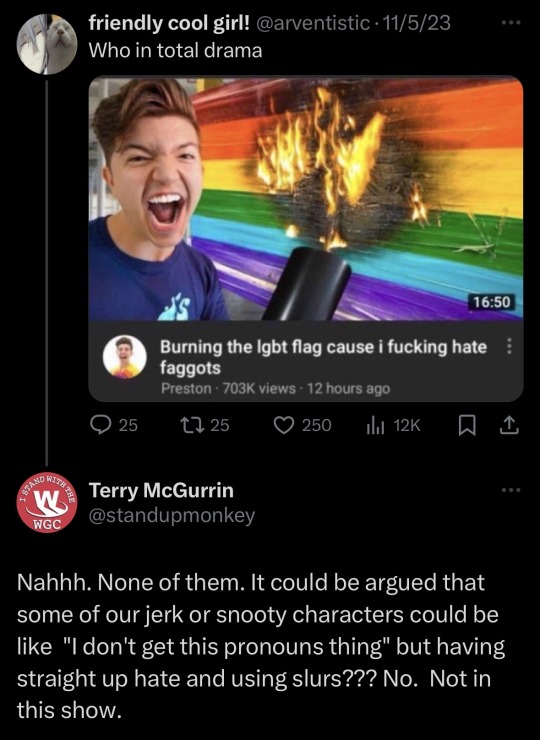
None of the contestants would have hate towards gay people
I also think it’s kind of weird to just give characters the homophobic/transphobic headcanon just because of how they look or how their attitude is?? Completely insane
Also just saying criticizing/negatively questioning people on their lgbtq+ headcanons for characters is literally insane. It’s called a headcanon for a reason?? It’s never been confirmed except for a few characters?? Like come on, let’s be serious for a few moments !
#total drama#tdr#tdi#total drama headcanons#total drama hot take#lets not make characters homophobic just because of their personality#lets also not be mean about harmless headcanons??#its so childish#‘oh no they would probably—‘ lets not !#im just stating something that bugged me#it was so ridiculous 😭#i cant even#thats like if i told somebody who headcanons harold as gay ‘no he’d call gay people slurs on mic haha’ like stfu??#you cant just act like your opinion is a Fact#its alright to say ‘<character> is <whatever> because I SAY SO’ like thats Fine because its clearly lighthearted and a joke#like YES for example alejandro is gay because i say so!! but that doesnt mean its a fact? its just a joking saying#because it’s an opinion#im not stating it like everyone who disagrees is wrong and im right
30 notes
·
View notes
Text
every time I see a “it’s actually totally fine and nbd to have sex you don’t enjoy and are uncomfortable with because your partner wants it and you want them to be happy, as long as you’re giving uncoerced consent!” post I lose a month off my lifespan
#can /some people/ do this and have it be healthy for them? sure#but this is the overwhelming pressure both in a relationship and from society#and ime at least it has fucked me up a lot#to have sex i technically gave uncoerced consent to#where i was uncomfortable and unhappy and doing it to try and make my partner happy#bonus points for ‘it’s just like any other activity! just like you can watch a movie you don’t like for the sake of your partner#you can take a few hours to have sex you don’t like for them’#like come on now.#sex is not in fact psychologically identical to movies for most people#when i was a kid my school often made me watch movies I didn’t like or want to watch#you can say this isn’t ideal but#surely you can see. how this is different. than if they had made me have sex i didn’t want.#whatever WHATEVERRRRRR i know the sentiment is helpful for a lot of ppl#and i probably go too hard in the opposite direction#but im not framing myself as a wise advice giver im just rambling in tumblr tags abt my issues#if i were giving advice. well personally i would try to be more nuanced#than ‘don’t worry about it! it’s fine and normal to have sex you’re uncomfortable with and if you disagree you’re acephobic’#but that’s just me.#therapists dni#oh also I agree that people shouldn’t have to fake ‘normal reactions’ to sex#or to try and have orgasms if that’s unrewarding for them etc#im stone! its complicated! i get it!#but you gotta be careful to give the message ‘it’s complicated’#and not just. encouraging ppl to do things they’re genuinely uncomfortable with to make their partner happy.
13 notes
·
View notes
Text
examining a seemingly normal image only to slowly realize the clear signs of AI generated art.... i know what you are... you cannot hide your true nature from me... go back where you came from... out of my sight with haste, wretched and vile husk
#BEGONE!!! *wizard beam blast leaving a black smoking crater in the middle of the tumblr dashboard*#I think another downside to everyone doing everything on phone apps on shitty tiny screens nowadays is the inability to really see details#of an image and thus its easier to share BLATANTLY fake things like.. even 'good' ai art has pretty obvious tells at this point#but especially MOST of it is not even 'good' and will have details that are clearly off or lines that dont make sense/uneven (like the imag#of a house interior and in the corner there's a cabinet and it has handles as if it has doors that open but there#are no actual doors visible. or both handles are slightly different shapes. So much stuff that looks 'normal' at first glance#but then you can clearly tell it's just added details with no intention or thought behind it. a pattern that starts and then just abruptly#doesn't go anywhere. etc. etc. )#the same thing with how YEARS ago when I followed more fashion type blogs on tumblr and 'colored hair' was a cool ''''New Thing''' instead#of being the norm now basically. and people would share photos of like ombre hair designs and stuff that were CLEARLY photoshop like#you could LITERally see the coloring outside of the lines. blurs of color that extend past the hair line to the rest of the image#or etc. But people would just share them regardless and comment like 'omg i wish I could do this to my hair!' or 'hair goallzzzz!! i#wonder what salon they went to !!' which would make me want to scream and correct them everytime ( i did not lol)#hhhhhhggh... literally view the image on anything close to a full sized screen and You Will SEe#I don't know why it's such a pet peeve of mine. I think just as always I'm obsessed with the reality and truth of things. most of the thing#that annoy me most about people are situations in which people are misinterpreting/misunderstanding how something works or having a misconc#eption about somehting thats easily provable as false or etc. etc. Even if it's harmless for some random woman on facebook to believe that#this AI generated image of a cat shaped coffee machine is actually a real product she could buy somewhere ... I still urgently#wish I could be like 'IT IS ALL AN ILLUSION. YOU SEE???? ITS NOT REALL!!!!! AAAAA' hjhjnj#Like those AI shoes that went around for a while with 1000000s of comments like 'omg LOVE these where can i get them!?' and it's like YOU#CANT!!! YOU CANT GET THEM!!! THEY DONT EXIST!!! THE EYELETS DONT EVEN LINE UP THE SHOES DONT EVEN#MATCH THE PATTERNS ARE GIBBERISH!! HOW CAN YOU NOT SEE THEY ARE NOT REAL!??!!' *sobbing in the rain like in some drama movie*#Sorry I'm a pedantic hater who loves truth and accuracy of interpretation and collecting information lol#I think moreso the lacking of context? Like for example I find the enneagram interesting but I nearly ALWAYS preface any talking about it#with ''and I know this is not scientifically accurate it's just an interesting system humans invented to classify ourselve and our traits#and I find it sociologically fascinating the same way I find religion fascinating'. If someone presented personality typing information wit#out that sort of context or was purporting that enneagram types are like 100% solid scientific truth and people should be classified by the#unquestionaingly in daily life or something then.. yeah fuck that. If these images had like disclaimers BIG in the image description somewh#re like 'this is not a real thing it's just an AI generated image I made up' then fine. I still largely disagree with the ethics behind AI#art but at least it's informed. It's the fact that people just post images w/o context or beleive a falsehood about it.. then its aAAAAAA
25 notes
·
View notes
Text
as cool as their design is im really starting to dislike the sonau in general, aside from their stuff suddendly being everywhere and everything being about them and how cool(tm) they are now with the mystery stone turning people into dragons and the similarities between the sonau and the three dragons (naydra, eldra, farodra) its actually not an impossibility that they used to be sonaus as alot of people have been theorizing about ..but ...... idk that would very much ruin their otherwordly yet ethereal mystery to me
i probably sound like some hater whos trying to find something more to dislike about totk all the time but i promise im not!!
the three dragons being some unexplained mystery, beings that are there yet few can see them, timeless, nigh untouchable, they dont act on anything, they dont talk, something about them has always made me look at them in awe; if it turned out they were just yet another cool(tm) sonau guy that ate a stone ... :/
not a fan of that one lads, but dont worry, i will keep my thoughts to myself from now on, i dont want to ruin other peoples fun nor seem like i just hate everything ... the three dragons are just really important to me so i had to say something
#ganondoodles talks#tloz#totk#totk spoilers#totk spoiler#besides i have leanred that i tend to have the unpopular opinions and frankly im tired of the hate directed at me#if you disagree thats fine but please dont spam me with why you think its cool actually#bc it just feels like yet another argument starting as to why im wrong and need to be talked down to and also suck actually#sorry its been all over my timeline on twitter so i just had to throw my dumbass opinion out there again#and it was a few times more than id like in a row where my random thought posts where torn apart by arguing people needing to prove im wron#the dragons where something i just absolutely loved in botw#they hold a special place in my heart and i dont like the thought of them too being just yet another sonau thing#i feel more secure posting my thoughts here than on twitter#but still i dont want to sound overly negative so i will hold back from now on#unless im exhausted and overly tired and not feeling that great physically like right now i guess lol#ill just have to grit my teeth and try to ignore everything i dont like but everyone else loves like always#anyway i need some sleep#ill be fine after that i think#and then try to resume work on destiny and a commission i havent had the energy to get to
106 notes
·
View notes
Text
ALSO, I JUST WANT TO SAY.
Although I'm not the biggest Ivypool fan, I never really was, THE FANDOM ISN'T EXACTLY ALWAYS NICE TO HER EITHER.
Now, it's not as bad as the way they've treated Dovewing. And Ivypool often felt like a fan favorite, even !!
But. I've also seen some terrible takes on THE BOTH of them. Alongside Hollyleaf as well.
Honestly, those three cats seemed to get a lot of weird controversy meanwhile Jayfeather is Literally Perfect Boy to the fandom, and even LIONBLAZE doesn't really get much hate- he's just seen as kind of boring, which, is pretty accurate for the majority of the time he had a POV. very starkly different vibe the fandom has towards those cats meanwhile Holly, Ivy, and Dove all stir up arguments all the time.
Them being flawed characters are a GOOD THING and idk why some people dont get that
#warrior cats#wc#wc hot takes fr#im sorry im pissed off right now#i like starting trouble ig idk#nothing makes me more upset than seeing undeserved hate towards things#i've always disagreed with a lot of the wc fans opinions tho#more recent ones arent usually this bad but.#what can you expect from a book where ivypool and dovewing have large roles?#people are so mean to them. both of them.#i have my reasons to dislike ivy but COME ON#THIS BOOK WAS GOOD#ivypool#ivypool's heart#IT FEELS WEIRD IM THE ONE SAYING THIS WHEN FOR THE LONGEST TIME. I WASNT AN IVYPOOL FAN.#ive hardly ever seen a single person ever in my whole life ever even dislike jayfeather.#i think blixemi doesnt like him and thats literally the only person i can remember ever saying they dont like Jayfeather#and like ITS FINE TO LIKE HIM!!! thats not my problem#my problem is. why do you like whiney boy over there but not dovewing#and sometimes even ivypool and hollyleaf#anyways#yeah#my point is#this fandom confuses me
14 notes
·
View notes
Text
at this point i dont think i really like Lilia for who he is and its more of the fact that his relationship with Silver so INTERESTING to me
take your fandom goggles off for a moment and just look at them from an outsider’s point of view. Lilia is far from a perfect father, but Silver talks about him like he’s some literal god who rescued his ass from the pits of hell. most children don’t feel the need to “repay” their parents for raising them with love and care, which is completely valid because that’s the bare minimum of what a parent’s supposed to do.
Lilia has many flaws— he looks down on his schoolmates because he believes that he’s wiser and they’re just weak, fragile little humans. he takes people’s trust for granted and impulsively does whatever he wants without considering others’ feelings, probably because he doesn’t understand them as well as he thinks he does. he acts friendly and outspoken, but never reveals anything truly personal about himself because of the emotional brick wall that even his sons could not tear down.
Silver is the opposite. he views everyone as his equals, sometimes even regarding himself as inferior. he’s always considerate of other people and tends to be more empathetic than he realizes. he’s very quiet but genuine and doesn’t mind talking about his own personal experiences and turmoil.
deep down, i think there’s very little trust between them. they love each other more than the sun and moon, but would rather cut off their left hands than admit they both have issues. Silver doesn’t wish to be a burden, and Lilia refuses to let anyone see beyond his mask of being nothing but an easygoing and wise bat fae.
#again these are just my own thoughts and headcanons#its fine if you disagree but dont be an ass about it or act like youre correct and im not#familial relationships in general are such a wild and foreign concept to me#ive never experienced any kind of familial love before and i cant understand it#which is frustrating as someone with hyperempathy#but also makes characters like silver and lilia so intruiging to me#i wanna hold them close and inspect them under a light#twisted wonderland#twst silver#lilia vanrouge#disney twisted wonderland#twst headcanons
85 notes
·
View notes
Note
Why did ppl hate topaz?
it was back in the aetherium wars event over in belobog, tldr she comes in to retrieve an age old debt that belobog has to the ipc, does the typical ipc thing of offering to assist (aka turning belobog into one of the ipc's planets or smth along those lines) with the eternal freeze; however she doesn't really mention that the thing only has a 66% success rate.
people didn't like her because of the colonizer (i think? i don't remember exactly) vibes she was bringing and to be fair she was an antagonist in that event, but in the end she does agree to hold the ipc off after seeing belobog put itself together, and even takes a demotion as a hit so i wouldn't say she's that bad, she's just morally grey and very misguided (she sees the ipc lowkey in rose tinted glasses) and sometimes people don't like that and categorize characters in good and evil - and topaz got stuck with evil
#mail 🏵️#anon#again like in my post !!! i'm not saying you can't not like topaz#that's completely fine we can agree to disagree <3#i just find topaz fascinating as a character and i love her so !!!#she's a very complicated character in terms of morality so it's natural that ppl have different views on her#it just made me sad for ppl to overgeneralize her character sometimes (thankfully its not like that anymore. i think) and stick her as evil#but hey !!! to each their own
18 notes
·
View notes
Note
I find that people who get upset at fans who prefer canon are also the ones who don't read comics/don't want to read comics though I don't really get it. I like a bit of fanon too but what's the point of fanon if not supplemented by canon? if your fanon so directly contradicts canon then how is that not just an oc? ("but new52/modern writer says--!" those people don't read comics either and just go by word of mouth that's how we got stuck with Morrison's Talia)
Here's the thing and I've said it before I don't care if you've never picked up a comic in your life and your happy enough just getting content for these characters through fan works - honestly if your happy and enjoying yourself that's all that should matter - but then I've also spoken to a lot of lovely people who have never seen a comic panel in their life and don't get offended when I bring up more canon traits of characters or try to argue with me when I mention something that is canon but has a popular fanon that contradicts it - which really is the thing that bugs me when someone sees me discussing canon and takes that as a personal attack against them and all their beloved fanon like I've not got my own beloved fanon I refuse to let go of
#ask#anon#that post is such an a + example#im literally just talking about how much i prefer dick and tims relationships#and its triggered so many people#that being said#a majority of replies have been very respectful and lovely even the ones that disagree with me which is fine#i personally love hearing other peoples opinions on these types of things#its why i make these posts lmao#but yeah that being said#comic writers not reading comics is a personal offence to me#like come on dudes#you literally have a job that means you kinda have to read comics
80 notes
·
View notes
Text
not even gonna tag this properly bc i don't wanna get Involved but i do have some Thoughts i need to get out into the void so here we go
(aaa quick edit: CW for mention/discussion of Boothill leaks)
#today's gone Badly and i'm upset but instead of venting abt it i'm gonna channel that energy into doing a bit of tag rambling abt Boothill#well. less abt Him and more abt uh. self-analyzing my anxiety surrounding contributing to fandoms. he's just today's catalyst#like. i know it's mostly a me thing. i'm hypersensitive to criticism and very conflict avoidant + socially anxious + perfectionistic etc.#so I'm the one that keeps myself from posting more stuff out of fear of being criticized or called-out for what i've made#bc inevitably Someone's gonna see it and think its OOC or a problematic take or they'll misread my intent. etc etc what have you#but like. that's inevitable. there's no way to communicate every single thing with all of the nuance required to avoid misunderstandings#and other times it's not a misunderstanding it's just a difference of opinions and that's Fine!! there's no accounting for personal taste#there's no accounting for several things actually. taste‚ bias‚ lore-knowledge‚ differing levels of chronic-online-ness‚ etc#so this isn't me complaining abt the state of fandom culture (although i do think. sometimes. ppl take shit a bit too seriously)#but anyways all of this is mostly just anxiety-fueled. it's not like i very often actually even receive negative feedback or anything#if anything ppl tend to tell me that i'm overthinking it and killing my own fun and worried that my stuff is more OOC than it is#which like. yeah. Yeah u right :) but that's just the way that i am! always losing the idgaf war i suppose#anyways what's Boothill got to do w this ur wondering. well. i've been thinking abt the quickly emerging concept that he's illiterate.#and it just. has me feeling a lot of ways. and watching ppl disagree over it has me feeling some Bad ways. bc it's def a loaded topic!#if you'll pardon the pun there. and i don't rlly have anything new to add other than that i'm conflicted abt it.#like yeah i saw the leaks days ago. of him mentioning 'not hitting the books' much as a child when we ask him why he sends voice messages#or voice Transcriptions ig. ykwim. and like. *braces for impact* ...i liked it? like. it doesn't feel right to call it endearing#i'm not trying to infantilize him. ok that's not the right word either but ugh. you know? what i mean?? who am i kidding even i don't know#it's not quite right to say that it feels like Representation either. but it's something close i guess#as a southern person myself who didn't receive a 'complete' education due to factors that weren't to do with my intelligence#the concept of seeing him as a capable force to be reckoned with and respected who also happens to have not received much formal education#i like that. i do. but there's so many issues w it at the same time. like. as i said‚ being southern myself has me Wary of the way Hoyo is-#writing him. as well as of the way that the fandom is taking the bits of his lore and running away w them. and i'm Very aware of how ppl-#will see a southern character and be All Too Eager to agree that they're lacking intelligence based on our Redneck™ stereotype#sigh. and before we even go too far with this. it's not even confirmed that hes completely illiterate. which is a valid criticism i've seen#there's Multiple reasons that could make him prefer voice to text. but regardless. i'm just worried that ppl will misconstrue my intentions#like. example: that edit i made the other day of him saying 'no thanks i can't read'. wasn't me playing into the stereotype of-#'haha dumb country boy can't read!' it was. in my eyes. something he'd say as a joke to make light of a potential insecurity#like. i think there's far more depth to Boothill's character if ppl could look past the surface. and i dont wanna contribute to the problem#but sometimes ppl Will have stereotypical traits and i wish the same could apply to characters as long as it's done Thoughtfully.
13 notes
·
View notes
Text
because i’m a timepetals girlie first and foremost i guess i have to talk about how some believe that 14’s ending is very much reminiscent of rose’s ending with tentoo’s. and that some aren’t a huge fan of that.
from my perspective 14’s ending is a continuation of journey’s end. tentoo’s ending is all about concluding the doctor’s arc about longing to be human and his desire to settle down with rose: the one adventure he can never have. through tentoo the doctor gets to have that. but 14’s ending doesn’t have that same theme. yes donna says the famous line about the one adventure the doctor has never had but in reality it’s got a lot more to do with trauma and the doctor finally choosing to stop running. this is why i don’t entirely agree with the criticism that 14’s ending is just tentoo’s repackaged because they’re about two entirely different themes. yes they both centre around the doctor getting this impossible happy ending but one’s about the doctor’s desire to be human and the other is about the doctor’s trauma. they’re just not the same and i believe it’s better to view it as an over-arching story with tentoo just being a single example of the doctor not allowing himself happiness, alongside the numerous other sacrifices the doctor has made for the sake of others, and 14 finally giving himself that, concluding the doctor’s overall arc.
the doctor infamously hates endings so him choosing this definitive ending for himself really exemplifies how far he’s come. going back to rose’s ending, although i believe her’s is ultimately a happy one, there is definitely an underlying sense that she’s being pushed to make a choice. ten is very obviously compelling her to choose tentoo despite the fact she hasn’t been given any proper time to think this through. i’ve always read this scene as the doctor desperately trying to give rose this perfect happy ending so that he won’t kill himself immediately afterwards. as long as she gets this unambiguous, definitive fairytale ending with a doctor who can give her the love she deserves then he’ll be fine. then he’ll be alright. in the end, ten sacrifices his own happiness so that rose can have her’s.
14 on the other hand is choosing himself. although he’s choosing an ambiguous fate by settling down with the noble family it’s ultimately a happy one. i think it’s intentional that we don’t know where he’ll end up after this. who he’ll regenerate into next - if he can even still regenerate. this is character development!! instead of pushing donna away like he did rose and trying to chug along like everything’s fine the doctor decides to step into the unknown. he isn’t the same anymore and he might outlive the nobles but what matters the most is that right now he’s the happiest he’s ever been. he allows himself to get to have that impossible happy ending. he’s choosing to stop running - something that the show has been building up to for 18 years: for the doctor to let go of his burden. he’s seen so many chances for him to permanently settle down fly right past him (11 protecting trenzalore, 12 living on derilium for 24 years with river and obviously rose choosing tentoo) but now he’s deciding to stay.
furthermore, to argue that this conclusion isn’t built up enough and just comes out of the blue i just plain disagree with. in the very first special donna questions the doctor on why it’s always “one last trip” and tells him that they could do normal things like go for coffee and hang out like mates. there’s a million reasons why the doctor ‘can’t settle down’ but to donna settling down is as simple as pie. this shows the extent of her love for him and how at the end of the day she just wants him to be alright. she has such a deep connection with him that she knows that the doctor continuing to run isn’t good for him. secondly, in wild blue yonder there’s a lot of focus put on the doctor’s deteriorating mental state and his desperate wish to be understood by donna but also how deathly afraid he is of opening up. copy-donna points out how they haven’t had a chance to talk and that “It’s always like that with you. Running from one thing to the next” yet again reminding the audience of how the doctor hasn’t stopped running. on top of this we see how the flux and the revelation about him being the timeless child have completely uprooted his sense of purpose and identity. he blames himself for the destruction of half of the universe and it’s clearly ripping him apart far more than anything else has before. he can’t go on like this anymore. finally, in the giggle the doctor admits that he doesn’t believe in himself anymore, how he’s all “sonic, and TARDIS and Timelord” but once you strip that all back, get rid of the toys, there’s nothing left. he literally says “What am I?”
throughout these specials we see the doctor in a state we rarely see, especially for such a prolonged amount of time: he’s directionless. the doctor never really knows where he’s going next but at least he’s excited, at least he feels some kind of thrill. i don’t get that vibe from 14. he doesn’t know who he is anymore, and he needs to figure out who he is. regenerating again wouldn’t fix that.
all that’s keeping him going pretty much is donna. getting to settle down i think is the only satisfactory conclusion for 14 and him dying - even though he was ready to do so - would’ve just been too depressing and might’ve sent out the wrong message. bi-generation recontextualises regeneration as being about birth instead of death. you don’t have to keep running, you don’t have to keep moving on and pushing everything down. you can finally feel what you’ve been ignoring. all that pain, all that anguish, all that love. you can rest now. you can go home. and that doesn’t mean you have to die. doctor who isn’t about tragedy anymore and that isn’t a bad thing. although this version of the doctor getting the impossible happy ending isn’t as bittersweet as tentoo’s ending, it doesn’t make it any less thematically significant. 14 was prepared for his time to be over, more so than most other doctors. but just this once, everybody lives, just this once, he lives
#becoming bi-generation’s no1 defender here lol#doctor who#doctor who specials#doctor who 60th anniversary#doctor who spoilers#dw spoilers#if you disagree with me that’s perfectly fine ik for some 14’s ending like bit of a ripoff of tentoo’s#i definitely felt that initially#and its an arc that means a lot to people including myself#but this is just how i see it#bi generation#bi-generation#bi regeneration#my bi-generation thoughts#bigeneration
21 notes
·
View notes
Text
The truth is every queer person has the right to come out on their own terms, and on their own timeline. They also have the right to choose not to come out at all. The forced conformity of the closet can not be answered with the forced conformity in coming out of it.
-Alex, Red White & Royal Blue (2023)
i want to talk about this quote. full disclosure, it’s because i keep seeing some really frustrating takes (some of which veer into queerphobia) and i am getting a bit annoyed with people and rather than directly addressing it with them & appear to be picking a fight im going to make an analysis post in my space. (tbf. its mostly on twitter and i have a priv account so that limits me)
disclaimer; this is my interpretation, im not saying its the only interpretation just something to consider. i am queer & cognitively disabled - don’t assume malice and dont be cruel. i will ignore and block freely.
tl;dr/very simplified summary: it doesn’t mean “dont ever speculate about other people’s sexuality” but rather that ‘coming out’ in the way society understands it shouldn’t be a necessity for queer people to exist openly as queer. full context under the cut & self-exploration questions at the end.
so lets start with the context. alex is talking at a point in time when the world has read their emails and so knows both are queer (bi & gay, specifically), but neither alex/the white house or henry/the palace have commented. so more simply - alex and henry are known to be queer, but have not come out. alex uses the speech to come out as bi, and as being in love with henry. he also uses it to imply that he & henry should have the right to choose not to do this formal coming out alex is doing.
—
okay. lets get into the quote analysis.
The truth is every queer person has the right to come out on their own terms, and on their own timeline.
reasonably self explanatory. each queer person gets to decide their own timing for coming out, and the way that they want to address their sexuality.
They also have the right to choose not to come out at all.
this is where problems with interpretation have started to appear. fundamentally yes, this means people are allowed to not be openly queer/‘out’ if that is what their decision is. but it also means that they can be visibly queer - for example being in a visibly queer relationship; signalling with their aesthetic (e.g. someone being butch, someone who wears only ‘girl’ clothes despite that being at odds to their assigned gender); casually posting about queer things on social media etc - without addressing their own sexuality to others.
it does not mean that you should assume everyone is straight until they explicitly tell you otherwise. and quite frankly insisting that it does mean that is veering into homo-/bi-/queer-phobia because you are insinuating that being not-straight is a negative thing.
The forced conformity of the closet can not be answered with the forced conformity in coming out of it.
some people seem to be interpreting this as ‘you shouldnt force people out of the closet’ and i don’t think thats quite to the nuance of what it means. yes, i do think that is part of it - in much the same way as the previous sentence - but it is not really the whole of it. in my opinion this is actually addressing - at least to some degree - the concept of ‘we should assume people are straight until they explicitly say otherwise’.
the ‘forced conformity of coming out’ addresses the idea that to be “out” you have to follow these steps; that you have to make a public statement that ‘this is my sexuality and i am [queer/bi/gay/pan/ace/etc]’. you are conforming to this precedent of “how to come out” that countless queer people have followed. there’s nothing inherently wrong with doing so, but actually there are different ways to be queer - and even being “out” as queer - that don’t involve following that playbook.
here’s a hypothetical to demonstrate my point. two men, who have never dated any women, live together & spend basically all their time together over 5-10 years. they holiday with each other’s family, they’re always together at events (e.g. weddings of non-mutual friends), but they’ve never told you/the public that they’re queer and/or dating each other. at what point does one start to assume they’re together? and does the answer change if its a man & a woman rather than two men? if a man & a woman did that, people would assume pretty early on they’re probably dating. but yet when it’s two men suddenly it’s invasive to speculate. this is where this concept of the forced conformity of coming out comes in - along with the veering into homophobia i referenced earlier - why must they say the words “i am gay” for it to then be ‘okay’ to consider that they’re together? (the homophobia comes into play because if you think being gay is morally neutral (which it is) then you shouldn’t have any issue with the speculation about people being together regardless of their genders.) the idea that straight is the default is where this forced conformity starts to really kick in.
—
i guess the main things i want people to ask themselves are these (and i have been asking myself these questions, there is no judgement or censure just self examination):
1. do you think people can be openly queer publicly without explicitly sharing that they are queer? (by this i mean in an announcement or in casual conversation. can you be openly queer without ever addressing it explicitly?)
2. if you do, why do you think that talking about the possibility someone is queer is something that should be hushed up? is it because there is an internalised concept that being queer is something abnormal and/or negative? if it was a straight couple would you feel the same way?
3. what does “coming out” mean to you? why does it mean that, what have you internalised to get to that conclusion & is it something that always works or are there other ways to be openly queer (or ‘out’ if you prefer)?
4. is it possible that there are queer people living openly and happily as themselves without explicitly addressing their sexuality to the wider world, who don’t want to address it publicly? does this make them closeted or ‘less’ queer to you? if so, what makes you think that?
#dont @ me ab the summary till youve read the post its simplified#rwrb#red white and royal blue#rwrb movie#elio’s meta#elio’s#rwrb meta#this is a sideblog so all replies/asks will be done publicly. if you want it to be private send a dm#i do have a degree in lit analysis so. yeh. but im happy to discuss this civilly if you disagree#key word being civilly if youre angry at me save your breath i will ignore you#i choose not to talk explicitly on my blog about the topic people are using the quote about#if you want to talk about it dm me thats fine. but i am uncomfortable talking about it where i cant control who sees it#i have been.. grumbling about this vaguely its tagged in my negative feelings tag but ive got to a point now#where this quite interpretation is really annoying me#and i cant stop myself#*this quote interpretation - ofc id typo in the tags on my phone where i cant edit it#my punctuation might be terrible i lost track of what i was doing with apostrophes#ive edited this to death procrastinating posting it so im just gonna post it#who cares anymore
28 notes
·
View notes